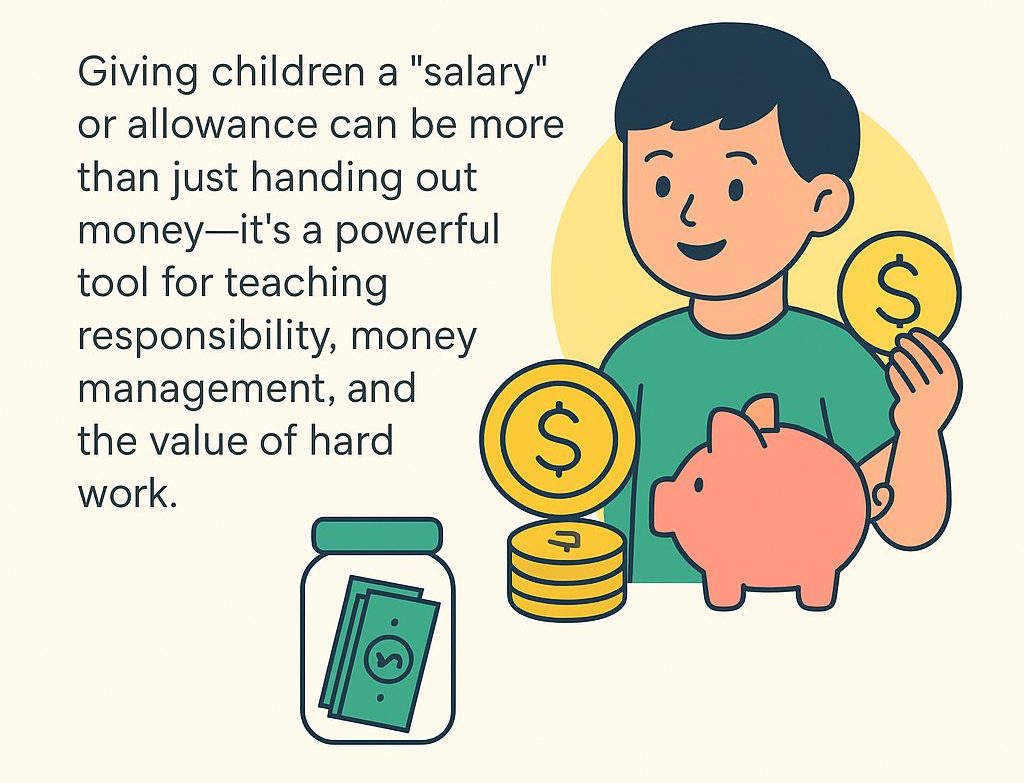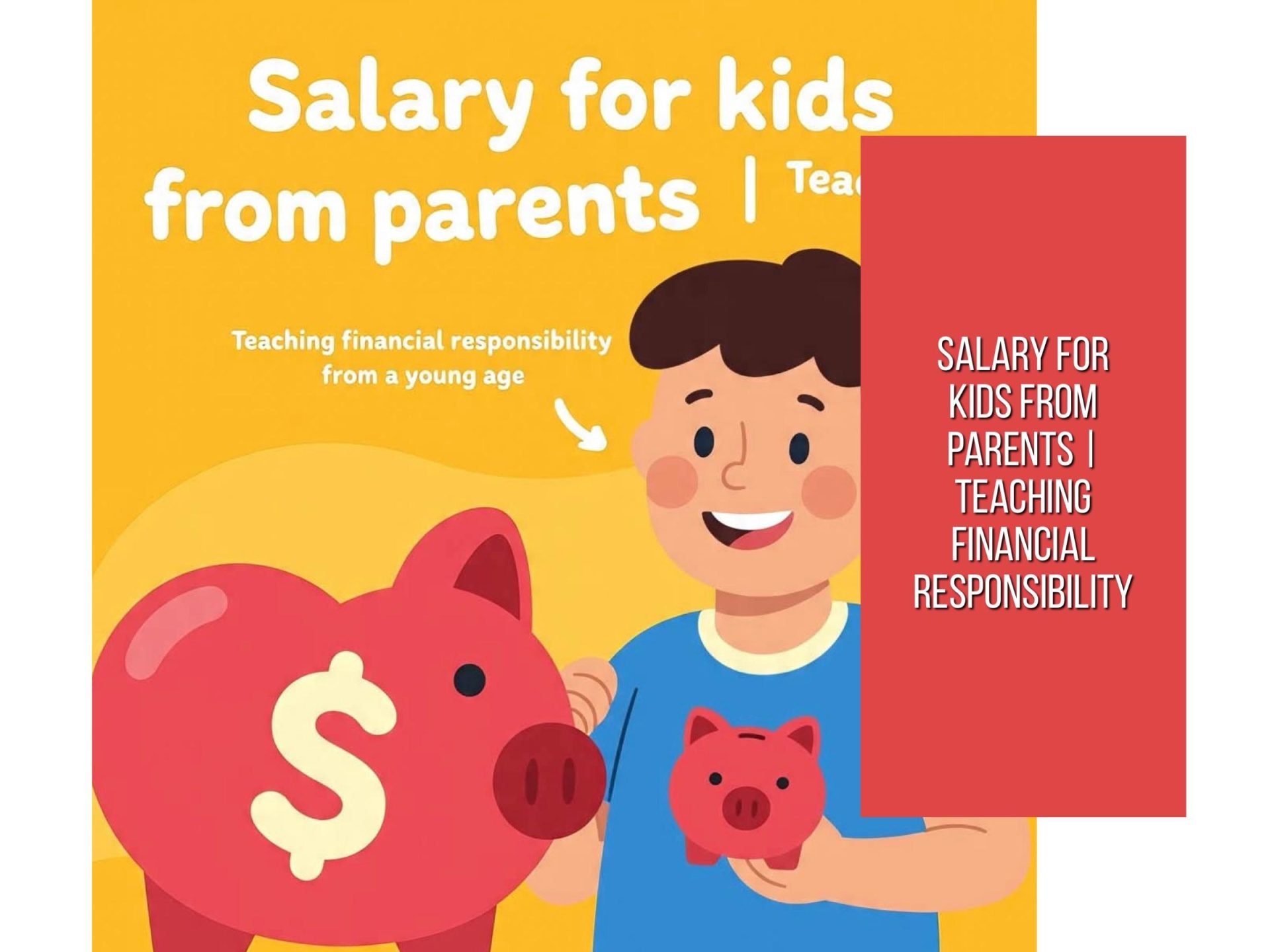Salary for Kids from Parents | How Much Salary Should Kids Get? Simple Parent’s Guide
Wondering What Salary to Give Your Kids? Here’s a Smart Guide for Parents, Giving children a “salary” or allowance can be more than just handing out money, it’s a powerful tool for teaching responsibility, money management, and the value of hard work. When done right, this practice helps kids understand where money comes from, how to spend wisely, and the importance of saving. In this article, we’ll explore why giving kids a salary is beneficial, how to introduce it effectively, and the life lessons it can offer.

What Is a Salary for Kids? (salary definition for kids).
A salary for kids, often called an allowance, is a set amount of money that parents give to their children regularly, weekly or monthly. It can be tied to completing chores or given as a tool to teach money management. Some parents offer a “fixed salary” for basic tasks, while others use it as a reward system for extra responsibilities.
This small financial arrangement mirrors how adults earn and manage money, making it a useful early lesson in real-life economics.
Why Is Giving a Salary Important for Kids?
1. Teaches Financial Responsibility
When kids receive money regularly, they learn how to manage it. They make decisions about spending, saving, and even giving. This helps them develop healthy financial habits early on.
2. Builds Work Ethic and Accountability
If the salary is tied to chores or tasks, kids understand the connection between effort and reward. This encourages responsibility, consistency, and a sense of achievement.
3. Develops Budgeting Skills
Children begin to understand the concept of budgeting—setting money aside for things they want, need, or dream of. It’s a great way to introduce goal-setting and planning.
4. Encourages Saving Habits
Having their own money gives kids the chance to learn delayed gratification. Whether saving for a toy or a special trip, the practice of setting money aside teaches discipline.
5. Teaches the Value of Money
Children who manage their own money realize how quickly it can be spent and how long it takes to earn. This builds respect for the efforts their parents put in to provide for the family.

How to Introduce a Salary System for Kids?
1. Set Clear Guidelines
Decide how often and how much money to give. Will it be weekly or monthly? Is it tied to chores, or is it simply to teach money management?
2. Differentiate Between Needs and Wants
Help kids understand the difference between buying what they need (like school supplies) and what they want (like candy or toys). This awareness will guide their spending.
3. Use Jars or Envelopes
Divide the salary into three jars:
- Spend – For immediate purchases.
- Save – For future or bigger items.
- Share – For charity or gifts.
This method makes abstract ideas more concrete.
4. Let Them Make Mistakes
It’s okay if kids spend all their money too quickly. These small “mistakes” are valuable lessons in decision-making and consequences.
5. Involve Them in Small Financial Decisions
Take them grocery shopping or include them in discussions about saving for a family outing. These real-life examples reinforce what they learn from their own salary.

Salary vs. Wages – A Simple Guide for Parents to Teach Kids
When giving your child a “salary,” it helps to first explain the difference between salary and wages in a way they can relate to.
| Aspect | Salary (Like Parents Earn) | Wages (Like Hourly Jobs) | How to Explain to Kids |
|---|---|---|---|
| What It Means | A fixed amount paid regularly (weekly, monthly, or yearly). | Money earned based on the hours worked or tasks completed. | “Salary is like getting your pocket money the same every week. Wages are like getting extra coins only when you do extra chores.” |
| Example | A teacher earns $50,000 per year, split into equal monthly payments. | A cashier earns $15 per hour. If they work 10 hours, they get $150; if 20 hours, $300. | “Dad’s/ Mom’s salary stays the same each month, but if you mow two lawns instead of one, your wages double.” |
| Stability | Predictable and steady, good for family budgets. | Changes depending on how much or how little someone works. | “With a salary, you know how much you’ll get. With wages, you only get what you worked for.” |
| Benefits | Often includes extras like health insurance, vacation days, and retirement plans. | Usually does not include extra benefits. | “Salary jobs sometimes come with bonus gifts—like paid holidays. Wages usually don’t.” |
| Why It’s Given | For jobs where completing tasks is more important than counting hours. | For jobs where time or effort is directly measured. | “Salary says: finish the job well. Wages say: get paid for each task you do.” |
Why This Matters for Kids
By using the allowance system at home, you can teach your child both concepts:
- Their regular salary (weekly allowance) shows them stability.
- Extra chores (like washing the car or babysitting) can be treated as wages to show how effort equals extra earnings.
Examples of Age-Appropriate Salaries
Ages 5–7
Small amounts for helping with simple chores like putting away toys or setting the table.
💡 Tip: $1–$2 weekly.
Ages 8–10
Increase the amount and responsibilities—organizing school bags, watering plants, helping with dishes.
💡 Tip: $3–$5 weekly, based on effort.
Ages 11–13
More complex chores like folding laundry, babysitting younger siblings, or assisting with meal prep.
💡 Tip: $6–$10 weekly, with bonus options for extra work.
Long-Term Benefits of Giving Kids a Salary
1. Builds Confidence
Managing their own money gives kids a sense of independence and pride.
2. Prepares Them for Adulthood
These early lessons serve as building blocks for adult responsibilities like paying bills, saving, and making wise financial decisions.
3. Strengthens Parent-Child Communication
Discussing money openly fosters trust and helps kids feel included in the family’s decision-making process.
4. Encourages Generosity
Teaching kids to share a portion of their salary helps develop empathy and the joy of giving.
FAQs
1. At what age should I start giving my child a salary?
You can start as early as 5 years old with small amounts and simple responsibilities.
2. Should salary be tied to chores?
It depends on your parenting style. Tying it to chores teaches accountability; a fixed allowance teaches budgeting without performance pressure.
3. What if my child spends all the money on junk?
Let them learn through experience. Discuss better choices afterward and guide them, not punish them.
4. Can this lead to entitlement?
Not if done with clear rules and responsibilities. It’s important to emphasize earning and gratitude.
5. What’s better—cash or digital payment?
For younger kids, cash is tangible and easier to understand. For older children, digital tools like kid-friendly debit cards can teach real-world finance.
Conclusion
Giving a salary to kids isn’t about spoiling them, it’s about preparing them for life. When done with thought and guidance, it becomes a valuable learning tool that builds responsibility, confidence, and smart money habits. Start today with small steps and simple lessons, and you’ll be setting your child on the path to a financially wise and independent future.
At StoriesCastle.com, we believe in turning everyday moments into powerful learning experiences. Visit us for more articles that make parenting practical, fun, and impactful, plus do not forget our bedtime stories!
See also: Best Educational Toys for Toddlers | A Guide for Parents Who Want to Raise Smart Kids
Kids allowance.








